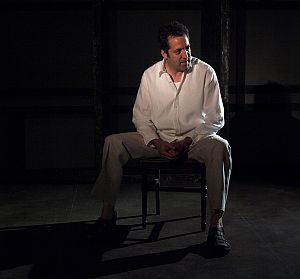
(Host) We’re in the middle of summer theater season across the region and there’s something new at the Weston Playhouse.
For the first time in the theater’s history, the Playhouse is hosting a world premier.
The play is titled the "The Oath." It tells the story of a Chechen doctor who tries to do the right thing in the impossible moral context of war.
VPR’s Susan Keese has this preview.
(Keese) The Oath is a one-man play adapted from an autobiographical book by Khassan Baiev, an exiled Chechen physician living in this country.
In the mid-1990s and again early in this decade Baiev lived through periods of crushing violence, as Russia retaliated against the Chechen independence movement.
(Ewen) "And the story’s based on his reaction to those wars. What do you do when you’re faced with impossible choices?"
(Keese) Malcolm Ewen directs the play. He says Baiev fell back on the Hippocratic Oath as a guide to his choices.
(Ewen). "He treated people from all sides who made it to the hospital where he was. And because of that he got in trouble with both sides."
(Introduce music and continue under)
(Keese) As actor Ian Barford, who plays Baiev, begins to speak, we learn that he is working at a menial job in a U.S. hospital that does not recognize his medical credentials.
The Chechen music woven through the scenes Baiev brings to life creates a sense of place, and a past that will not let him be.
(Barford) " I had a friend, Vaha, an old friend of mine who one night late in the war was shot and found his way on to my table . ‘Khassan! Help me! I have two children, I don’t know why they shot me.’
"‘Why?’ is a question for men living outside of war or for men living in the light of death. The dead are allowed that luxury. And that is when I knew it was too late to save him, but I tried to stabilize him anyway."
(Keese) In the recollection that follows, Baiev attaches an IV to his own arm and tries to save his friend with a direct transfusion, although he knows it’s futile.
He speaks of a recurring dream.
(Barford) " I am in a hospital in my own country back in the war again. Men are everywhere on beds and benches and on the ground, curled into themselves, moaning, bleeding deep red blood. I’ve tied tourniquets but they won’t stop bleeding. They call out to me, ‘doctor, doctor.’ And they are dead, nothing but bodies waiting for the ground but still bleeding and still calling and I can’t reach them. I should not have lived."
(Keese) Khassan Baiev wrote his memoir with help from Ruth and Nicholas Daniloff, who live in Andover. Daniloff is a retired foreign correspondent who spent much of his career in the former Soviet Union.
The script is by Gavin Broady is a 26 year old playwright from Portland, Oregon. He read the book and thought it told an important story about how war and political decisions affect human lives. He sees Baiev as a hero.
(Broady) "He consistently made impossibly difficult decisions with an integrity that is unfathomable. And yet he is suffering a toll for that, and for the rest of his life he will."
(Keese) Broady sent an early version of his script to the Daniloffs. They contacted the Weston Playhouse, which decided to take the project on.
Broady hopes ‘The Oath’ will spark awareness about Chechnya. He says Americans, if they think about it at all, mistakenly relate the Chechen independence movement to Islamic Jihad.
One of the characters in Baiev’s monologue is the Chechen commander who launched the 2004 debacle in which 200 school children died as Russian troops stormed the school where Chechen rebels held them hostage.
Watching on American television, Baiev struggles knowing that he once saved this Chechen commander’s life. But he also struggles with the portrayal of the man as another Osama Bin Ladin.
A woman he meets at the hospital asks Baiev where he’s from.
(Barford) "The footage was all over the news. No one was talking about the Russian blundering, just flashing the words, ‘ Chechen terrorists’ at the bottom of the screen. And so when the old woman asks me where I’m from, for a second, I think, why not just say Russia. She would not know the difference. And the second I say this, I am ashamed. And so I say, Chechnya. And this look comes over her face, this horror. And she says, Chechnya. Why are you killing all those children?"
Broady says the play doesn’t offer any answers to the questions it poses. He doesn’t think Baiev would want that.
If the play has one message, he says, it’s that war changes people, often in unpredictable ways.
For VPR Backstage, I’m Susan Keese.
Note: The Oath will be staged through July 25th at Weston’s "Other Stages" theater.